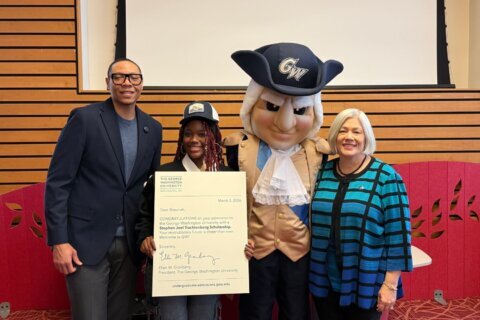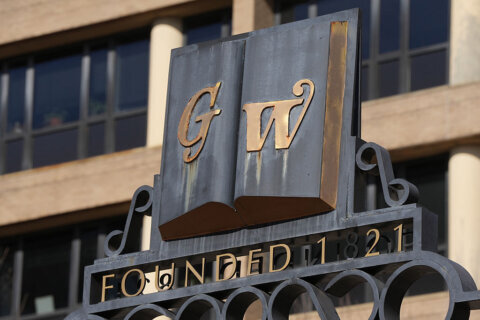More and more states around the country are legalizing sports betting, with visions of millions of dollars pouring into state and local government coffers. That’s especially now that revenues have slowed because of the pandemic, and many local governments are staring at shortfalls.
Betting has been legalized in D.C.; voters in Maryland are in the process of deciding the question, and gaming companies are putting in their applications in Virginia.
But will it work? And how? And for whom?
This week, WTOP’s series “Betting on the Future: A look at sports betting in the DMV” is assessing the state of gambling in each area jurisdiction.
If you think you’ve heard rosy projections about sports betting before — well, you have. When city leaders rushed to enact sports betting in the District in 2018, they promised tens of millions of dollars in new revenue would be flowing into the city by now.
But earlier this year, city leaders had to revise revenue projections from $28 million to $12 million for the fiscal year that just began.
And while the start of football season, which is generally more popular with gamblers than other sports, generated tens of thousands more wagers in September than any other month so far, the city only generated about $600,000 in tax revenue.
Most of the money wagered in the city is bet by people willing to stand in line, sometimes for almost an hour, in order to bet cash at the William Hill sportsbook operating out of Capital One Arena. But most of the tax revenue generated for the city has come through people using the DC Lottery’s much-maligned Gambet app.
City leaders are defending the Gambet app even while those in the gaming industry say D.C. is doing it all wrong.
“In the time when people aren’t exactly tripping over themselves to go into retail environments, that you have that kind of sportsbook outperforming an online sportsbook speaks volumes about where D.C.’s market is today,” said Chris Grove, with Eilers and Krejcik Gaming, a research and consulting firm.
“What we expect in a typical market is for online to be about three, four, five times the size of what retail is,” said Grove. “Even in Las Vegas, which is the Mecca for retail sports betting, you’re seeing online generate the majority of activity. In a lot of cases, that’s someone in a sportsbook placing a bet online, but that speaks to what the general customer preference is.”
WTOP SPECIAL SERIES: BETTING ON THE FUTURE
- Betting on the Future: Maryland makes plans for a windfall
- Betting on the Future: A question of competition in DC
- Betting on the Future: Going mobile in Virginia
- Betting on the Future: Where does all the money go?
- Betting on the Future: Ted Leonsis on bringing sports betting out of the shadows
D.C. entered a $215 million, no-bid contract with the Greek company Intralot to build a mobile app for DC Lottery. It’s the only app that gamblers can use around most of the city, but the gaming industry says the odds and payouts it provides for winning bets fall far short of what experienced gamblers expect. Grove’s firm did a study on behalf of Fan Duel and Draft Kings and urged city leaders to take its online sports betting regulations in a different direction.
That roughly four times as much money was bet at Capital One Arena in September than on the city’s app tells those in the gaming industry that something was off.
They say more online competition around mobile betting would generate more bets overall, and thus more revenue for the city.
But the DC Lottery has argued it’s only targeting the casual bettor, not the high roller — and the fact that most of the tax revenue the city earned from sports betting last month came from the Gambet app could back that up.
‘It’s too early to judge’
D.C. Council Chairman Phil Mendelson, who was a staunch supporter of the Intralot deal, said the pandemic and the lawsuit filed against the city after awarding the contract are the biggest reasons why the money the District envisioned hasn’t materialized.
“I would say yes — it’s a concern that the revenues are not what we expected,” said Mendelson. “On the other hand, I think it’s too early to judge that it has not worked right.”
“I know the private industry doesn’t like that we have a state owned-app, and they would just as soon see [the money] all with them,” he added. “But the rate of return is different.”
And that rate of return is why Gambet is outperforming William Hill in tax revenue generated, even though a lot more money gets bet at William Hill. Asked whether he was concerned that in-person betting was more popular than the city’s app, Mendelson said he didn’t know the industry well enough to judge whether that was a problem. But he’s optimistic about the future of betting in the city.
“I expect that the revenues will keep growing,” said Mendelson, who added that the city’s chief financial officer hasn’t flagged Gambet as a problem for the city’s budget yet.
“I think it would be a mistake for us to change” the system already, he added. “I think we need to let this all settle out.”
‘Competition brings a lot of things’
But Grove warned that if the city doesn’t start opening up competition, gamblers will start depositing their money into online accounts in Maryland and Virginia.
“Sole-source providers are always going to be challenging, because it is competition that brings a lot of things to the market that consumers want,” Grove said.
“If you go with a sole-source provider, they will generate better margins for you on every dollar bet,” he added. “They’ll do that because they’re charging high prices to consumers.”
But that doesn’t last forever, he warned.
“Consumers are likely to respond negatively to this and the ultimate impact to you is less money net-net. Even though you get more of every dollar with this approach, way fewer dollars are wagered, and what you end up with is a market that’s less interesting to consumers and less competitive.”








